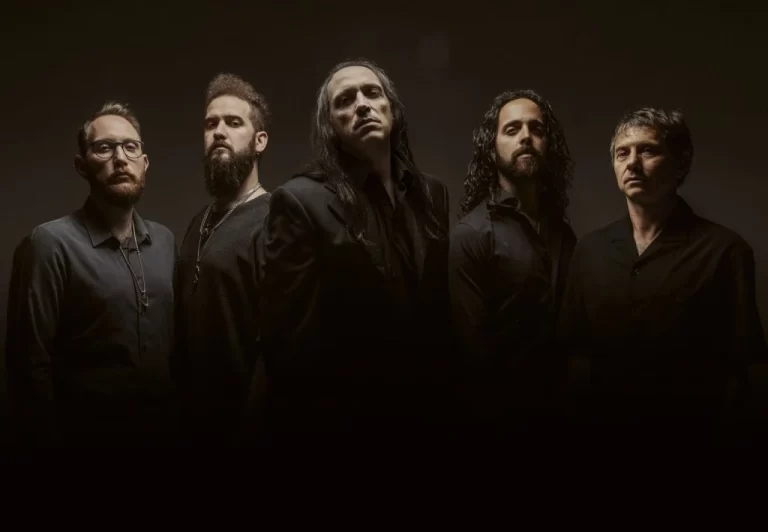At the beginning of January, 2018, Steve Hackett released his latest live effort, the epic ‘Wuthering Nights’ concert, filmed in Birmingham and paying tribute to both his latest solo work, ‘the night siren’, and his final album with Genesis, the elegant ‘wind and wuthering’. Whilst the latter remains a timeless work that is beloved by many progressive rock fans, ‘the night siren’ is both musically stunning and lyrically powerful, dealing with such timeless themes as migrancy and the plight of refugees; topics rendered all the more potent in the current political climate. Having watched the concert (you can find a full review here), I was eager to speak to Steve in order to discuss the development of his musical and lyrical themes, as well as the enduring legacy of Genesis, and it was a proud moment when he agreed to take time out from rehearsal to speak to me.
Eloquent, passionate and thoughtful, Steve takes his time to answer each question, frequently referring to influences that initially surprise and yet make perfect sense with hindsight. The discussion (rendered verbatim below) takes in a wide range of topics and offers a glimpse into a guitarist whose place amongst the greats is firmly assured.
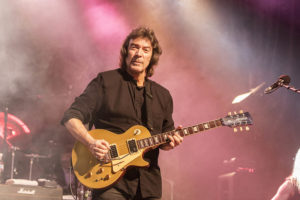
The first thing I wanted to ask is more about your guitar playing and technique because the way that, I feel, you play guitar is that it’s very lyrical and it’s not necessarily what you play that’s important but also the spaces you craft between notes and what I wanted to ask first is, when you’re working on a song, do you have an image or a mood in mind that you use to shape the way you create the solos?
Well, it varies from tune to tune. I think you’re absolutely right when you say it’s creating an atmosphere, but then you need to be aware of what that atmosphere might be. I’m wary of falling back on technique. I think there is a tendency, if you can play remotely quickly, to want to keep shoehorning as much technique in as you can into solos, but there are times when a melody might do just as well, and I do sometimes think of the guitar as a bit like a voice. To sustain a note and let it do its thing – just float and cry and do all those things and use vibrato with it. Those are things that most instrumentalists draw from singers who do that. And it’s their raison d’etre as singers. For the rest of us, I suspect we’re imitating things that people do with the human voice.
That comes across in the way that, on some of the tracks, both new and old – you’re guitar lines cry out over the background melody – it’s a very interesting way of playing and I feel it’s very important to have that space as well as technicality.
Well, I think so. I think the gallopers do tend to shift. When Hendrix was gracing our shores for the first time, he was known as a fast guitarist, but then when you watch a lot of the films, what he’s doing is that he’s not actually playing in time at all. He’s playing around the rhythms – he’s going in and out of it the whole time and you don’t actually have to play in time to produce something right. In fact, in don’t think there’s an actual description for it, but Nick Magnus, the keyboard player, who I did a whole tonne of albums with, said something about the way South Americans play percussion> There’s such a thing called “drag timing” as far as he was concerned, which was playing way behind the beat and responding to the beat in a way, but not necessarily in an in time, or an in tune manner. You’re playing around it and I’ve worked with people like that, a Hungarian violinist for instance, who… Sara Kovacs plays like that, when he plays violin. But then he plays trumpet – when he plays trumpet, he tends to play in time more, but when he’s playing violin, he’s kind of wailing behind the beat. He’s doing a thing which, he said to me, was like… because he does martial arts as well and he’s on the Hungarian Kendo team, and he said “it’s a bit like this – I choose to play or I choose not to play” in other words, he means not to play on the beat and respond to it. DO a little bit of what I think Frank Sinatra did with melodies at times, which is not necessarily to sing the line perfectly in time. There’s another approach.
One of the things that has kept me enthralled with your career over the years is that, although you have a healthy respect for your past and the artistic with genesis, you seem to always be learning and taking from other cultures and other musical styles that you’ve found on your travels – that process of music evolution is, I think, really interesting to hear and it comes across quite strongly, I think, on both ‘Wolflight’ and ‘the night siren’. For you, as an artist, is there a strong conscious element to incorporate new elements, or is it something that you hear that then finds its way into the music.
When I write, I try not to do it too consciously. I tend to wait for the idea to come to me. In fact, what often happens is that, when I’m trying to write something (and that obviously has to be a conscious process), I find that solution often comes when I put the guitar down, forget about it and try to do something else. Then, the line that I have been trying to find will present itself. I tend to usually write it down. If I write it down, I can go back to it, I can shape it. But, remembering is the thing. I hope that answers the question to some degree…
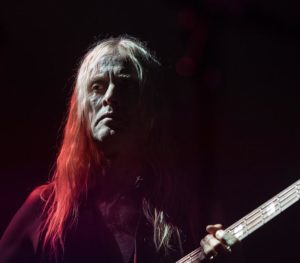
I know it’s a difficult thing to talk about because the process of song-writing is, on the one hand, a conscious decision to sit down and try to produce something, but more often than not, the more you try to actually compose something, rather than allow it to flow through you, the more it eludes your grasp, so I apologise for that!
No, no. you’re quite right to say “to allow it to flow through you…” It just doesn’t always work chronologically. It doesn’t work like switching on a tap, there has to be a certain amount of passive listening to yourself and letting the subconscious do what you’d love to do yourself. I just have to sit back and wait for the thing to fully emerge, but you mentioned other cultures, and I do listen to things form other cultures and there were lots of things that I couldn’t do at one time, technically. But I find, if I listen to people, like, for instance, flamenco players… I used to find that completely mystifying at one time, but I get an idea that it’s around patterns that you can do with the right hand and once you’ve got a couple of those, you realise that those people are the best rhythm guitar players in the world and then you just pick up on that somehow. So, there’s a little bit of Flamenco influence, as well as the middle-eastern stuff as well. So, unfamiliar scales would be a good thing to try to familiarise with to some degree. Sometimes when I’m working with Rob Townsend, I remember playing him a complete discord one day – the worst discord you can find – and he said “actually,” he said, “Bartok took those notes and made it into a scale and it works in the following way:” and he played me the scale and I thought “good god!” You know, that’s extraordinary, isn’t it, there’s a Bartok scale that utilises some of these things. Classical people are often way ahead of us, and we think we’re coming up with something or that we might have something which is completely useless, but then, if it’s… if there’s an orchestra playing it for instance, then certain things that sound very dissonant on the guitar can sound absolutely right when there’s a bunch of individuals playing it. Dissonant chords with orchestras can sound absolutely wonderful. They can sound like, in a way, dark cloud clusters.
That’s interesting imagery, because when I was listening to ‘Wuthering Nights’ there’s a particular moment when you segue from ‘Il Nino’ into ‘the steppe’, which goes quite a way back in your career. But those quite ominous, sort of neo-classical, sweeping, symphonic pieces… it was a really interesting way that those two tracks are so well interpolated despite being distanced by a number of years in terms of composition.
Yeah, Yeah – ‘Il Nino’, I think the first one, yeah… that’s more classical in a way, isn’t it? I’ll tell you what it is. There’s a collision of three separate ideas there. We’ve got orchestra kicking off, then we’ve got a tribe’s worth of drums, so you get that ethnic influence, but then there’s the rock band as well, so it’s all being interpreted through rock. But then you’ve also got those accents from the word go. You’ve got… the playing is very accented form the orchestra, form the word go, so yeah – I do like that collision of worlds. The unlikely constructions are what drives me. Then, there’s an early kind of middle-eastern influence on ‘on the steppes’, so that… I think, played by this particular band, at this moment in time, or rather that band that’s on ‘wuthering nights’, it’s pretty definitive. It’s a very tough version of that, so we’ve got Gary on drums, but he’s triggering samples as well, so the bass drum and snare are particularly tough sounding. So it does that thing… there’s an aspect of a marching band about it, so I suppose it’s quite military. Now, you might say military and romantic might be a contradiction in terms, but you get that with Ravel’s Bolero, which is the first album I bought when I was a twelve year old, all those years ago. I loved that, that was both romantic and it galvanised me and I used to do gymnastics at that time. I used to practise gymnastics a lot in the school team, or what have you, and I used to pretend to conduct that leaping around the room, and… you know, it still has that effect on me, there’s that feeling, that wonderful crescendo – there’s never been an exercise in crescendo quite like it has there? It’s the slowest build of anything ever and it’s also a piece of trance music, so… lots of people who like rock ‘n’ roll like Ravel’s Bolero.
I think that the influences that flow through form a lot of classical music – it’s interesting to see bands looking back to things like Wagner and Orff’s Carmina Burana… it’s just so heavy!
Exactly! And again, rockers love that! The fact that Carmina Burana… Cark Orff, yes! It’s iconic, isn’t it, and at the same time, it’s Pagan. It’s not actually Christian and usually, when you get massed choirs, they’re singing a whole tonne of Hallelujahs at you, but it doesn’t have to be like that. With Gluck and his Orpheus, it was the first time that it was non-religious, or at least not the religion that was being sanctioned by the church at the time, so that was a big break through way back in the day. It doesn’t sound shocking now, why would it? It’s very traditional sounding, but it is very beautiful music and, we’re back to the issues of what is life and what is death, and all of those things that concern those processes. There’s so much death in there and doom isn’t there? Death and doom and destruction –that’s it! The thing we’re all facing. We’re a gloomy lot really, but we try to do it with a certain amount of commitment and it can come out sounding extraordinarily strong, so I don’t mind a bit of death and destruction, it doesn’t have to be all sex, drugs and rock ‘n’ roll – what about death and destruction and all of that!
One song that really is a very poignant, yet very powerful piece, is ‘behind the smoke. Initially I thought it was only dealing with the modern issue of migrancy and refugees, but then you alluded to family members who had left Poland – was that a difficult idea to articulate for you?
Well, it was my wife Jo who came up with the opening lyric, the opening line: “behind the smoke is black”, in fact, are the words she came up with and I asked her “is this something about a war torn region and is it about refugees?” and she said yes, because obviously we talk about these things and we watch a lot of Al Jazeera, because it really does give you a much wider picture, whereas I find local news, whether it’s British or American, it tends to be about… if it’s American, it’s about what the Red Sox are doing this week, or what the White Sox are doing. DO you know what I mean? It’s almost like junior baseball league reporting whereas, I find Al Jazeera, it’s all over the world, it’s showing Yemen, and there aren’t too many networks talking about the fact that yes, there’s a crisis and five million people are potentially starving, so the world seems to wake up very late to these things.
Back to the song though… Yes, You’re absolutely right – when she first suggested that line, I thought “this’ll be interesting… trying to do this.” Then she came up with the line about “burning on the stone” and I thought “my god! This is going to be hard for people to take…” “how are we going to deal with this?” and “can I come up with a piece of music that’s worthy of a lyric that’s so in your face, in a way…” But, I’m pleased that we did and it only subsequently occurred to me that my own family, on my mother’s side, had been talking about religious pogroms in Poland and the Jewish side of the family and women being dragged along by their hair… this kind of stuff, yeah that’s what goes on… and I thought, “I’ll do this. I want to honour the family…” I feel that… what I really know of them is the fact that they lived in the East End of London and that they worked like crazy to eke out a living to support themselves and their families. But, before all of that, indeed, they were refugees and the important thing (I might have glossed over it), when doing it live, I tend to say that, if they hadn’t been allowed into this country, I wouldn’t be entertaining people that night. I like to hit people where, I like to think, it hurts. If they’re thinking that we should keep refugees out and all the rest, but without that, then you, perhaps, wouldn’t have this. You wouldn’t have my family, you wouldn’t have Jo’s family, who were also… there’s a side of them that came from the Jewish side of things. We’re not practicing, we don’t practice religion, but it just so happens that we both have families that were quite musical from way back. There a number of violinists in her family, you talk about the Jewish violin, all of that… so, yeah, it makes sense to me.
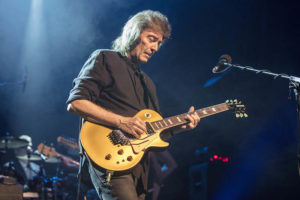
For me, as a listener, I’ve always been drawn to music that does carry (or has the potential to carry) a message or an awareness of society and change… but it’s difficult as an artist to juxtapose a social message and art with what we might consider the entertainment element of the business. Do you ever step back from something because you feel you’ve headed too far in one direction, or do you follow your muse regardless?
Well, there is social comment. I think the difficulty is to do social comment without being too didactic. I think you have to be informative to some degree, or else you’re narrative won’t carry, but it is a most difficult thing. The songs that I’ve found that resonate, for me, the strongest usually have got some kind of message to them. So, I don’t particularly want to make everyone feel guilty with every song that I do, but yeah, but over the course of an album, the beauty of a collection of songs is that they can function like vignettes, I think. I think you could be a fly on the wall and… if I could do the same thing that Karl Po did with sculpture – snapshots in stone and terra cotta, where something is captured – a moment that’s captured – it might be a flashpoint in people’s lives, it might be a personal thing or more of a political thing. I have to be flexible. I have to be open to things.
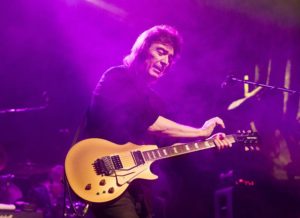
Obviously, over the last few years you’ve been working on the Genesis Revisited project alongside your own solo work. It must have been somewhat invigorating to revisit that old material and to see the response that it has garnered…
Well, I suspect that the other guys in Genesis don’t view the early work in quite the way that I do. I think that… I think it all depends on what you consider to be a “hit”. Those songs have proved themselves, both when we played them in front of people for the first time and in all the subsequent years. So they’ve had time to become part of people’s emotional life. Of course, whatever you sell, the 150 million albums or whatever it is that Genesis have done, you can always say that this album sold better, or that we had a hit single and that made the difference. But for me, in 1973 when we’d just done ‘selling England by the pound’, I thought it was something very special and we were just starting to tour America and we’d done a couple of shows around the New York area, we’d just started to pick up some press but then, we couldn’t do any other shows in the rest of America. There was an absolute lack of interest until we hit LA where we knew we were going to play the Roxy Club and we sold that out three nights running. But, meanwhile we were just there haemorrhaging money (usually other people’s at that point). But then John Lennon gave an interview and said that we were one of the bands that he was listening to at that point. Now whether he was just trying to be hip and talk about this young band he was listening to and he wanted to sound like he meant it, or whether he did like what we did, I don’t know. But we had his attention for, you know, five minutes, and that was a shot in the arm for me. As it was for Peter Gabriel, who was the one who told me he’d just given an interview and said we were one of the bands that he was listening to. That was a big deal for us, so I think of that music… it doesn’t have to get any more successful than that, it had the interest of fans then. It was a very slow burn, so these album shave eventually sold millions, whereas initially they sold averagely, shall we say. But I don’t need to have a number one single every five minutes to make a song worthy.
I love the idea of long-form pop. Call it what you will, I’m very happy with that, and I sometimes think the progressive tag is as much of a turn off as anything. I can’t imagine anyone who loved punk is going to listen to anything that was remotely branded progressive, except we weren’t aware that we were doing what was subsequently going to be called progressive. I know this is semantics here, but we weren’t aware that we were doing that. All we were aware of was that we were trying to do music that was surprising, that occasionally alluded to fusion or comedy or pantomime or big band or classical… whatever it was, but it was a wide range of influences, so nobody knew were any song was going to go, because you had five writers kicking in with ideas and so, it made the journeying process through those songs, so much more rewarding I think. Musical continuums, or whether you want to call it a kind of odyssey, all these pretentious terms… unfortunately, in order to describe music you have to use some other kind of language, and perhaps one can say too much> you can dismiss it or you can praise it to the hills…
It is the unfortunate nature of progressive that it does tend to have you reaching for the thesaurus…
[laughs] Reaching for the thesaurus, yeah, that’s it! Yeah!
Yet, sometimes it’s the most simple song that will do it, and one of the most beautiful songs that harks back to that period, which I’ve loved for a long time and I’m so glad to see you’re still playing, is ‘Afterglow’.
It’s a glorious melody and I think it’s Tony Banks’ best lyric, that one. It’s one of his and… it’s really heartfelt isn’t it? It’s a real cry from the heart and I’ve always felt very emotional playing that live. It’s the line “and I would search anywhere…” It’s love, isn’t it? It’s love in its purest form, so yep, it’s a love song… should have been a hit single! There’s still time, I guess, one day…


